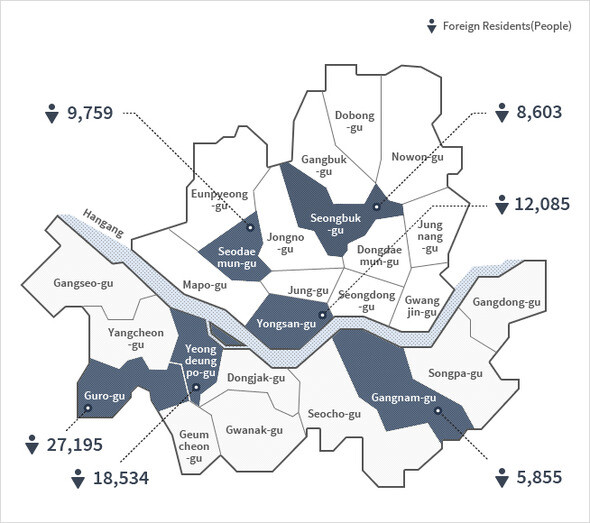hankyoreh
Links to other country sites 다른 나라 사이트 링크
Seoul to launch representative council for international residents

The city of Seoul is introducing a new council of foreign and migrant representatives to speak for the local international community.
The gesture for a dawning multicultural era in South Korea is a first nationwide.
The city announced on Dec. 16 that it would be instituting the council in the second half of 2015 to reflect the views of a diverse range of international residents for reference in policy decisions.
Seoul is currently home to around 415,000 international residents, or 4.1% of the city’s total population of 10,144,000.
As a first step, the city set up an eight-member “advancement team,” with participants including Yonsei University professor Han Seung-mi and Korea Migrant Workers Human Rights Center director Yang Hae-woo. It next plans to look at examples in Germany and Japan, as well as local cases like Ansan, Gyeonggi Province, a city with a large international population, before gathering opinions through a debate for international residents and an experts’ advisory meeting.
The city is also considering adding a new item for the council in its support ordinance for international residents and multicultural families and establishing a legal basis for the policy‘s introduction.
A “Seoul-style Non-summit” - the name is a play on the Korean word for “summit” - is also being organized from February 2015 as a forum for international residents to freely share their experiences with Seoul living. For the event, around ten international residents will gather for a frank talk with Mayor Park Won-soon about various topics, including inconveniences in daily living. The city also aims to launch a “southwest city civil/official council” to improve public order in the areas of Yeongdeungpo, Guro, Geumcheon, and Gwanak, which are home to around 130,000 ethnic Koreans from China.
“In the past, there haven’t really been any channels for Seoul’s international residents to take part directly in enacting or implementing city policy,” said Cho Hyeon-ok, director of the city’s office for women’s and family policy.
“We intend to work so that these people can also have ownership in city government,” Cho added.
By Eum Sung-won, staff reporter
Please direct questions or comments to [english@hani.co.kr]

Editorial・opinion
![[Guest essay] The real reason Korea’s new right wants to dub Rhee a founding father [Guest essay] The real reason Korea’s new right wants to dub Rhee a founding father](https://flexible.img.hani.co.kr/flexible/normal/500/300/imgdb/original/2024/0423/8317138574257878.jpg) [Guest essay] The real reason Korea’s new right wants to dub Rhee a founding father
[Guest essay] The real reason Korea’s new right wants to dub Rhee a founding father![[Column] ‘Choson’: Is it time we start referring to N. Korea in its own terms? [Column] ‘Choson’: Is it time we start referring to N. Korea in its own terms?](https://flexible.img.hani.co.kr/flexible/normal/500/300/imgdb/original/2024/0423/3617138579390322.jpg) [Column] ‘Choson’: Is it time we start referring to N. Korea in its own terms?
[Column] ‘Choson’: Is it time we start referring to N. Korea in its own terms?- [Editorial] Japan’s rewriting of history with Korea has gone too far
- [Column] The president’s questionable capacity for dialogue
- [Column] Are chaebol firms just pizza pies for families to divvy up as they please?
- [Column] Has Korea, too, crossed the Rubicon on China?
- [Correspondent’s column] In Japan’s alliance with US, echoes of its past alliances with UK
- [Editorial] Does Yoon think the Korean public is wrong?
- [Editorial] As it bolsters its alliance with US, Japan must be accountable for past
- [Guest essay] Amending the Constitution is Yoon’s key to leaving office in public’s good graces
Most viewed articles
- 1[Column] ‘Choson’: Is it time we start referring to N. Korea in its own terms?
- 2Senior doctors cut hours, prepare to resign as government refuses to scrap medical reform plan
- 3Why Korea shouldn’t welcome Japan’s newly beefed up defense cooperation with US
- 4Opposition calls Yoon’s chief of staff appointment a ‘slap in the face’
- 5[Guest essay] The real reason Korea’s new right wants to dub Rhee a founding father
- 6Terry Anderson, AP reporter who informed world of massacre in Gwangju, dies at 76
- 7[Column] The clock is ticking for Korea’s first lady
- 8[Editorial] Japan’s rewriting of history with Korea has gone too far
- 9New AI-based translation tools make their way into everyday life in Korea
- 10Survey: S. Koreans spend more time using smartphones than eating